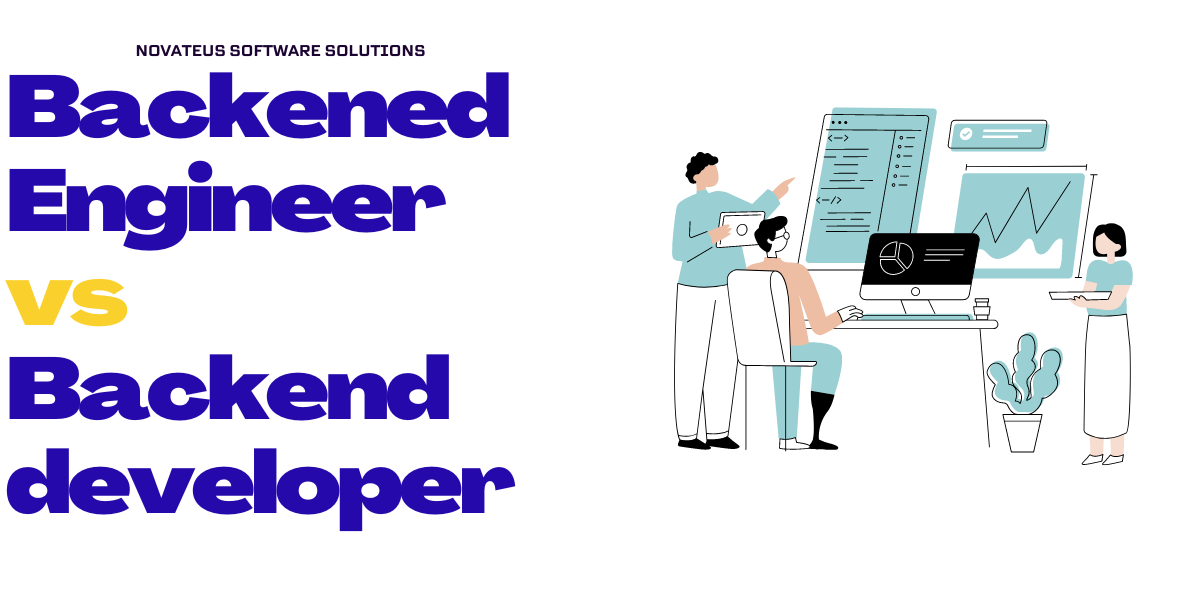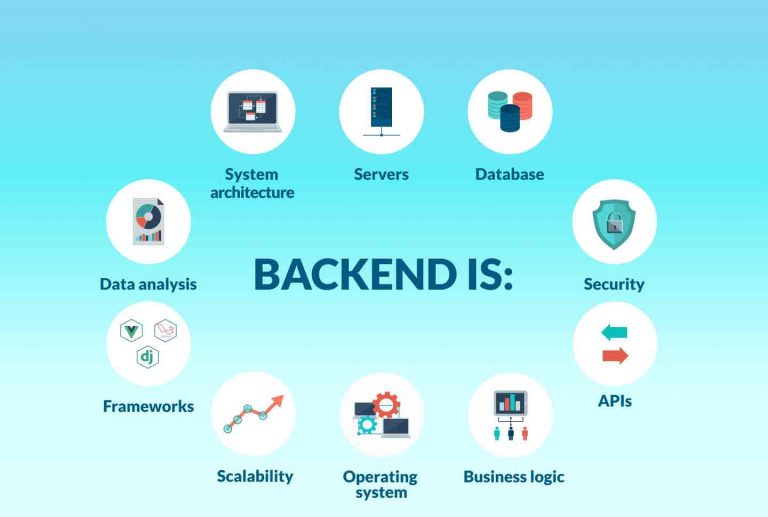What is the difference between a Backend Engineer and a Backend Developer?
While software engineers and software developers carry certain likeness, they also possess other roles and abilities that help distinguish what they contribute to creating software. This blog post will dig into the backend engineer vs. backend developer debate and discuss everything you should know about them!

A software development team has many individuals with different roles working on it. People frequently mistake backend engineers for having the same functions and duties as backend developers because both professions are identical. A software engineer and developer can perform similar jobs in development teams, where individuals perform cross-functional tasks to reach their goals successfully.
Backend Engineer vs. Backend Developer: Differences between Roles, Responsibilities, and Skills:
What is a Backend Engineer?
Backend Engineers are in charge of curating the organization of server-side information and building server scripts and APIs used by front-end engineers and UX designers. They collaborate with managers, designers, and frontline engineers to accomplish shared objectives. Although backend engineers shoulder a lot of the burden in software development programs, they don’t always receive recognition for their efforts. To summarize, a backend engineer’s primary duty is to create a software platform’s framework. In addition, they lay the groundwork for what the agile methodology must undertake to accomplish the primary objectives.
Backend Engineers-Roles and Responsibilities:

Building dependable and adaptable software in Scala, Ruby, C++, and Java is the responsibility of backend engineers. They create reusable software libraries and start continuous security measures.
Software engineers test the application, automate processes, and conduct code reports to aid and enhance the quality of our code. They also take part in engineering-related tasks by regularly reviewing the code for speed optimization, attending meetings daily with the front-end team members to address issues, and reviewing server code for enhancement.
Backend engineers customize the accessibility of all front-end applications and keep the server error-free. They also create features and upgrades for the program. They also contribute to brainstorming meetings, add suggestions to our innovations, algorithms, and programs, delve into challenging situations, and produce outcomes effectively and on time.
Backend Engineers-Skills:
Previous experience of working with various platforms, including mobiles, desktop, PC, and tablet computers, as well as with all stages of the software development life span, best practices, and Agile Software Development is needed.
- Backend engineers are well versed in front-end technologies like Java, CSS3, and HTML5 and server technologies like NGINX, Apache, and J2EE.
- Knowledge of Ruby, Linux/Unix, and scripting languages like Perl, Shell, etc., is essential.
- Awareness of accessibility, server compliance, server-side SASS, and LESS experience is crucial.
- It’s also essential to have expertise in NoSQL databases and database systems like DynamoDB.
- Experience of 2–7 years in software development and recent hands-on coding is required.
Additionally, they must convey complicated technological, architectural, and organizational issues succinctly and offer comprehensive incremental approaches. A skilled backend engineer can pay deep attention to detail and works under pressure. To accomplish goals, management, and monitoring, they prioritize different projects.
What is a Backend Developer?

Developing server-side software is backend development. Backend developers typically create the web applications and APIs used by front-end and smartphone application developers. They ensure the website functions properly by concentrating on databases, backend functionality, application programming interfaces (APIs), design, and servers. The backend developer focuses on the activities that enable the software program development process and is aware of the framework the backend engineer implemented. Without such tech services offered by a backend developer, the appealing visuals produced by illustrators, UX specialists, and front-end developers would be impossible.
Backend Developers- Roles and Responsibilities:
The primary function of a backend developer is to find the most effective way to create intelligent, user-friendly designs and transform them into websites by utilizing a range of tools, platforms, and languages. They must remain in touch with current best practices to accomplish this.
Developers produce straightforward, manageable, and create high-quality, efficient code to use in the future to build sustainable online applications. In addition, backend developers organize testing schedules to optimize user interface, ensure optimal representation on various screens, and oversee out-of-the-box technologies to improve apps.
Backend Developers evaluate the efficiency and adaptability of a website once it is life. As well as changes and modifications and make the code adjustments. They should troubleshoot and debug software while communicating it to project managers, QA teams, and stakeholders.
A skilled developer, directing, educating, and serving as a mentor for junior engineers, maintains workflow with customer staff to ensure continuing support.
Backend Developers-Skills:

- All backend developers must learn to program languages like Python, PHP, and Java.
- They should also know front-end languages like HTML, JavaScript, and CSS. The collections of backend programming languages, known as frameworks, aid in developing the web server configuration.
- It is necessary to have 2–5 years of CMS framework expertise. Since backend programming governs accessibility to the data, especially storage and restoration, it is crucial to understand how to preserve and retrieve data from databases.
- Developers need to have a thorough knowledge of web development. It would be much simpler if you knew how to safeguard servers and databases.
- Furthermore, they must be able to think critically and resolve issues as they come up with innovative solutions when creating an application. They ought to have good organizational and time-management abilities and be cooperative in team activities. Companies also demand a BS degree in Computer Science or a relevant field.
Backend Engineer Vs. Backend Developer-What Are The Primary Differences?
Due to their shared duties and obligations, the debate exists between backend engineers and backend developers. However, sometimes backend engineer’s job advertisements outnumber backend developer’s job roles.
The primary distinction is that a backend engineer is mainly in charge of interacting with the company’s executives. They supervise the project and team of the other developers. They also oversee the entire software platform and comprehend the whole application structure.
Conversely, a backend developer is to carry out the plans of the backend engineer. They each have distinct skills and functions that, when combined, allow for creating software applications.
Any software development team must include backend engineers. However, this does not mean that backend developer are useless since developers are the backbone of creating any successful software program.
Backend engineers handle an entire team and manage every meticulous detail of the software program. On the other hand, backend developers work as a team and have the role of the subordinates.
They also need unique skills for such roles. In contrast, a backend engineer has good leadership instincts and conversational skills to converse with clients. A backend developer must be a good team player to work with others on the software project.
Backend engineer vs backend developer-Which one do you need?
If you seek someone to design a strategy enabling your software products and overall arcitecture of software, you probably require a backend engineer’s help. However, you require a backend developer to work as a member of your software development team and handle crucial duties for the software development.
Both backend developers and engineers show business clients the site’s features. They together prepare technical documentation, write communication about the development process, and deliver reports on project results. Thus, this is where the similarities of both these jobs mix up and cause confusion for people.











